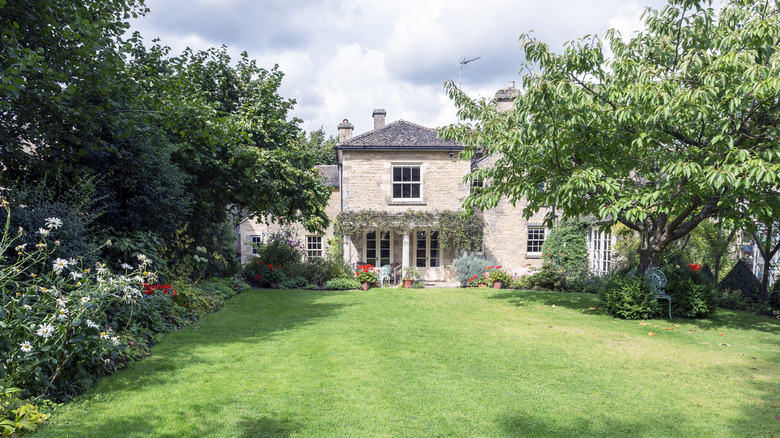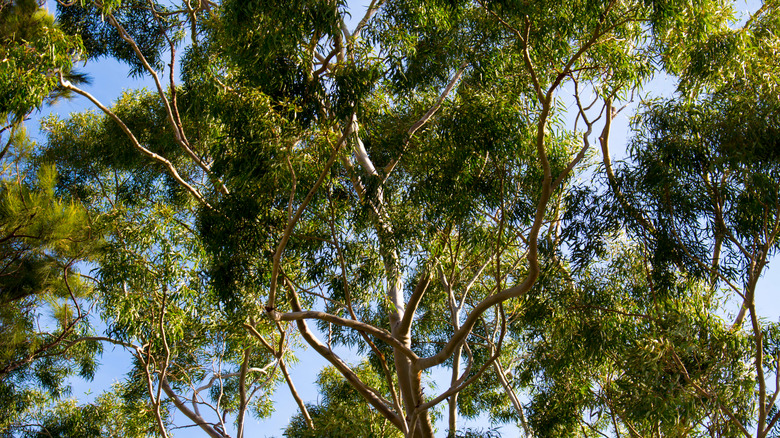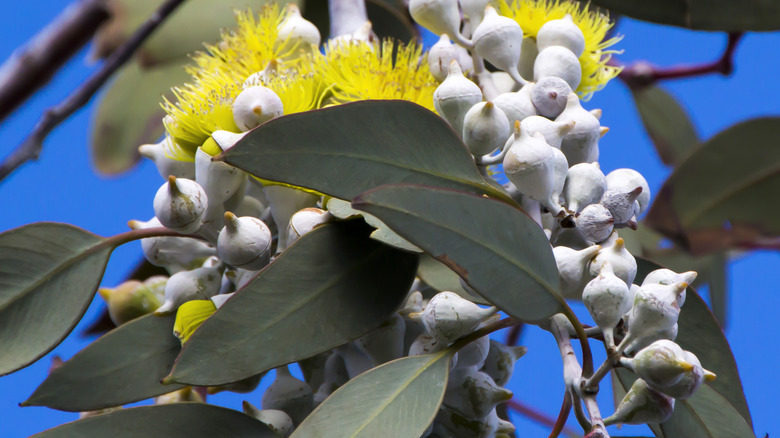Grow This Fresh-Smelling Tree To Add A Hint Of Lemony Fragrance To Your Yard
We may receive a commission on purchases made from links.
In a perfectly designed outdoor space, each plant is tasked with exciting one — or several — of your senses. The springtime rhododendron blooms are a treat for the eyes, the lush rosemary bush tempts the taste buds, and the fescue lawn becomes a soft, silky carpet for you to walk on. Meanwhile, plants like Eucalyptus citriodora, or lemon eucalyptus, are as magnificent to look at as they are to smell. These towering giants stun with their smooth, slender, white trunks, and give off a distinct lemony fragrance when you touch their leaves, or when the oils in the foliage volatilize in response to summer heat.
Lemon eucalyptus is native to Australia, but survives winters in USDA zones 9 through 11. If you live in the hottest regions of the U.S., you can plant this tree in your yard for a year-round citrusy aroma. If you're outside of this USDA growing zone, you have two options for growing the lemon eucalyptus. First, you can grow it as an annual in the garden and let nature take its course when the cold sets in. If letting the poor tropical plant meet such a cold, cruel demise seems unpalatable, you can grow it as a container plant. This way, you can let the eucalyptus enjoy the summer heat, then stay warm indoors all winter.
How to plant Eucalyptus citriodora
First, decide whether you will grow this eucalyptus plant indoors or out in the garden. If it's going in the garden, you'll need to find a suitable location that accommodates this tree's love of the sun and its propensity to grow quite tall. On the other hand, keeping the lemon eucalyptus in a container demands less planning and gives you more flexibility to move it to a sunny location in the summer, then transport it back inside when the weather gets cold.
You should start the lemon eucalyptus seeds indoors. If you want the tree to eventually grace your garden, start the seeds roughly two and a half-to-three months before the frosts ease off in your region. This way, you give the seedlings enough time to germinate and grow before transplanting them outdoors, if that's your plan. Begin by inserting the seeds into a moistened germination mix, and ensure that they're covered by the medium. When the seedlings emerge two to three weeks later, take the cover off the tray to promote good air circulation and give the young plants sufficient light. You'll be able to transplant them either to a container or the garden once they're 5 inches or taller and the temperatures do not fall below 50 degrees Fahrenheit at night. Make sure the substrate for outdoor plants is slightly acidic, has moderate nutrition levels, and does not retain water. Meanwhile, potted eucalyptus plants are best grown in a potting compost mix.
How to care for your lemon eucalyptus plant
If you've transplanted the eucalyptus seedlings into the garden soil, water them frequently until they get established. During this time, it's also vital to tackle invasive plants and weeds in the immediate area surrounding the young eucalyptus — this way, they don't risk losing out on moisture or nutrition. Over the following growing seasons, as the trees mature, you'll only need to water them during extended periods of drought. Once the trees reach their adult size and have strong root systems, you'll no longer need to water them. If you prune the lemon eucalyptus plants (either to mold them into a specific shape or prevent excessive growth), it's a good idea to feed the plants at least once a year with a fertilizer like this one from Walmart.
If you grow a eucalyptus plant successfully in a container, you'll need to water it regularly during the growing season. Providing too much or too little moisture is detrimental to the plant. The best practice is to water it until the water leaks out into the saucer, then allow the soil to dry out before irrigating again. Getting the lighting conditions right may be tricky with a potted eucalyptus, too. If you want the plant to stay healthy, you'll need to give it at least six hours of direct sun every day. Likewise, it's important to keep the container away from air conditioning vents, fireplaces, and other sources of cold or heat.


